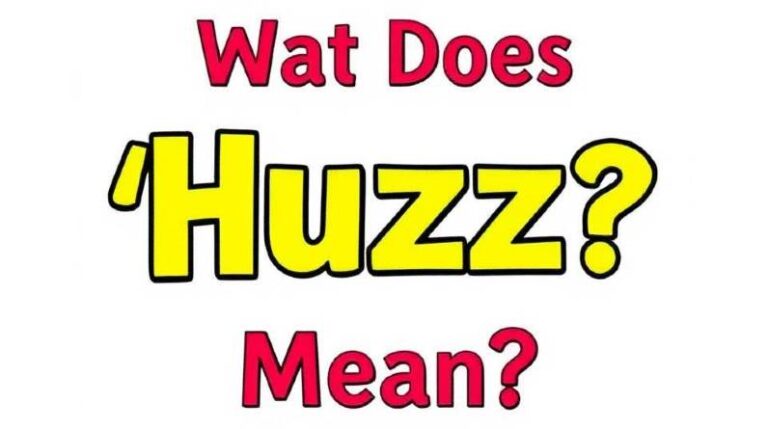In the rapidly evolving world of digital culture, slang changes as swiftly as the platforms where it’s born. One term that has recently gained traction among Gen Z and Gen Alpha is “huzz.” If you’ve heard teens throwing around this curious word in conversation or seen it trending on TikTok, you’re not alone in wondering what it means and why it’s causing concern among educators and parents.
This article offers a comprehensive, fact-based, and fresh look at what “huzz” means, where it originated, how it’s being used by younger generations, and the broader cultural implications surrounding its popularity.
What Is “Huzz”? A Straightforward Definition
At its core, “huzz” is a slang term used predominantly by teens and tweens to refer to women, typically in a context implying attraction or attention. It is, however, layered with multiple meanings and social undertones depending on usage.
Primary Meaning
- In many contexts, “huzz” is a euphemistic replacement for the word “hoes,” a term that is derogatory and misogynistic.
- It is used by young people, often without full understanding, to refer to a group of girls or a particular girl.
- In some circles, it’s a rebranding of older slang terms like “boo” or “pookie,” indicating someone they like or are trying to impress.
Example: A teen might say, “I did this for the huzz,” meaning they went out of their way to impress a girl.
The Origins of “Huzz”
The rise of “huzz” can be traced back to internet culture, particularly Twitch and TikTok communities.
| Influencer/Platform | Contribution to “Huzz” | Year |
| Kai Cenat | Popularized the term during livestreams | 2023 |
| TikTok | Spread the term through trends and memes | 2024 |
| Discussions clarified and debated its meaning | 2025 |
One viral trend featured young boys approaching groups of girls saying, “Greetings and salutations, huzz,” a line that turned the term into a comedic, yet somewhat controversial, challenge.
How Is “Huzz” Used in Context?
Innocent and Casual Use
In many schoolyards and TikTok videos, teens use “huzz” casually or even playfully. The intent isn’t always derogatory, especially among those who are mimicking slang without understanding its implications.
Problematic and Harmful Usage
For those more aware of the term’s connotation, “huzz” serves as a coded, demeaning reference to women. This mirrors older slang with misogynistic roots and reflects a concerning normalization of disrespect in youth culture.
The Broader “-uzz” Trend
“Huzz” isn’t alone in its category. It’s part of a growing digital dialect where familiar words are reimagined with a playful, absurd twist. This so-called “brain rot slang” includes:
| Slang Term | Derived From | Meaning |
| Bruzz | Bro | Male friend or brother |
| Gruzz | Grandma/Grandpa | Elderly person |
| Fuzz | Freshman | New students |
| Tuzz | Teacher | School staff |
| Chuzz | Chopped | Unattractive person |
| Muzz | Mom | Mother |
| Duzz | Dad | Father |
These terms are mostly humorous, but their repetitive, nonsensical formation contributes to what’s been labeled “chronically online” or “brain rot” behavior.
Social and Psychological Implications
The growing use of slang like “huzz” isn’t just about words; it’s about the attitudes and behaviors that come with them.
Reinforcement of Gender Stereotypes
Words like “huzz,” when used casually, can reinforce the objectification of women — especially when teens use them to generalize or mock.
Normalizing Misogyny
Mental health professionals and educators warn that continued use of such terms without understanding their implications could contribute to an environment that tolerates subtle sexism and bullying.
Stat: A 2024 survey by the UK’s Youth Language Council found that 62% of teenagers did not fully understand the offensive origins of slang terms they frequently used.
Parent and Teacher Responses
Psychotherapists recommend approaching the subject with curiosity rather than anger. Instead of immediately reprimanding a child for using “huzz,” parents should:
- Ask where they heard the term
- Clarify what they think it means
- Explain its connotations in simple, age-appropriate language
How to Talk to Kids About “Huzz”
Open conversations are key to helping kids navigate evolving digital language. Here’s a recommended approach:
Conversation Starters
- “I heard you say the word ‘huzz’ — can you tell me what that means to you?”
- “Do you think everyone finds that word funny or harmless?”
- “What do you think might happen if someone felt hurt by that word?”
What Not to Do
- Don’t shame them — this could lead to secrecy
- Don’t dismiss it — it’s an opportunity for a valuable lesson
The Linguistic Phenomenon
From a linguistic standpoint, the emergence of “huzz” reflects the inventive, rapidly mutating nature of language in online spaces.
Youth Culture as a Language Engine
Gen Alpha and late Gen Z are digital natives who repurpose language for humor, identity, and community bonding.
This linguistic creativity — while problematic at times — shows:
- A desire to create subcultural belonging
- A fascination with wordplay and suffix patterns
- The blurred lines between irony and reality in youth slang
The Impact of Streamer Culture
Livestreamers like Kai Cenat act as modern lexicon influencers, with words invented on camera becoming overnight viral trends. This illustrates the tremendous cultural power of influencers in shaping how language evolves.
Conclusion: Should You Be Concerned About “Huzz”?
The word “huzz” is more than just a passing trend — it’s a reflection of how digital spaces shape language, social behavior, and peer dynamics among youth. While not every use is harmful, the underlying connotations warrant awareness and open dialogue.
Parents, educators, and even content creators have a role to play in making sure slang doesn’t undermine respect and empathy.
Ultimately, understanding terms like “huzz” helps bridge the generational gap and fosters healthier communication in an increasingly online world.
Frequently Asked Questions (FAQs)
What does “huzz” mean?
“Huzz” is a slang term used by Gen Z and Gen Alpha to refer to women, often as a euphemism for the derogatory term “hoes.” It can also mean someone they admire or are trying to impress.
Where did the term “huzz” originate?
The term gained popularity through Twitch streams by Kai Cenat in 2023 and became a viral trend on TikTok in 2024.
Is using the term “huzz” offensive?
Yes, it can be offensive. While some teens use it playfully, it carries misogynistic undertones and can be disrespectful toward women.
How should parents respond if their child uses the term “huzz”?
Parents should approach the conversation calmly, ask where the child learned the word, and explain its implications in age-appropriate terms.
What are other similar “-uzz” words?
Other examples include “bruzz” (bro), “gruzz” (grandparent), “fuzz” (freshman), “muzz” (mom), and “duzz” (dad). These are part of a growing trend called “brain rot slang.”
Is “huzz” part of online bullying?
It can be. If used repeatedly or in a derogatory way, it may contribute to verbal bullying and should be addressed appropriately.
For more insightful articles and the latest updates, keep visiting Hacoo.

